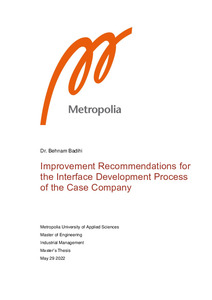Improvement recommendations for the interface development process of the case company
Badihi, Behnam (2022)
Badihi, Behnam
2022
All rights reserved. This publication is copyrighted. You may download, display and print it for Your own personal use. Commercial use is prohibited.
Julkaisun pysyvä osoite on
https://urn.fi/URN:NBN:fi:amk-2022060214675
https://urn.fi/URN:NBN:fi:amk-2022060214675
Tiivistelmä
The objective of this study was to propose practical improvement ideas for the interface development process of the case company. The interface development process at the heart of R&D is vital for the delivery of the products of the case company in a timely manner. As the interfaces are common for all the products, one interface change in one product means a change in all the products. Hence, the synchronized development of the interfaces for all products has been facing some serious challenges.
The research method of this thesis is design research conducted by utilizing the gate model of the department of Industrial Management at Metropolia University of Applied Sciences. This study consists of four systematic and academic stages. The current state analysis of the process was performed in the first stage to identify the strengths and weaknesses of the process. The weaknesses and strengths were then categorized under four classical industrial management themes including quality assurance, communication, competence and knowledge transfer, and program management. In the second stage, a comprehensive literature review was conducted concerning the findings from the previous stage to form the conceptual framework of the study. In the third stage, the initial recommendations were co-created with related stakeholders, and finally, in the fourth stage, the validation of the initial recommendations was conducted with senior management, and the final recommendations were created for improving the interface development process.
The outcome of this study was the final recommendations in the form of action points to improve the challenges related to the interface development process. The implementation of these recommendations should improve the process, eventually, enhance the efficiency of the work, reduce the defects in the final products, deliver the products on time, and increase customer satisfaction. Consequently, it promotes the overall satisfaction among the stakeholders involved in this process.
The research method of this thesis is design research conducted by utilizing the gate model of the department of Industrial Management at Metropolia University of Applied Sciences. This study consists of four systematic and academic stages. The current state analysis of the process was performed in the first stage to identify the strengths and weaknesses of the process. The weaknesses and strengths were then categorized under four classical industrial management themes including quality assurance, communication, competence and knowledge transfer, and program management. In the second stage, a comprehensive literature review was conducted concerning the findings from the previous stage to form the conceptual framework of the study. In the third stage, the initial recommendations were co-created with related stakeholders, and finally, in the fourth stage, the validation of the initial recommendations was conducted with senior management, and the final recommendations were created for improving the interface development process.
The outcome of this study was the final recommendations in the form of action points to improve the challenges related to the interface development process. The implementation of these recommendations should improve the process, eventually, enhance the efficiency of the work, reduce the defects in the final products, deliver the products on time, and increase customer satisfaction. Consequently, it promotes the overall satisfaction among the stakeholders involved in this process.
